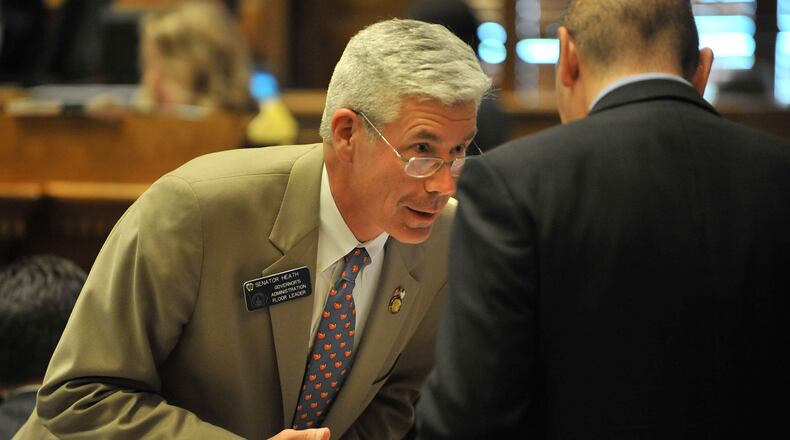The Georgia Senate gave final approval Friday to legislation maintaining the January reporting of the tens of thousands of dollars in donations many of them collect from lobbyists and special interests just before the legislative session.
The state Senate earlier this month approved legislation that would have eliminated a key Jan. 31 reporting of pre-session campaign contributions during years in which there aren't regularly scheduled elections, such as this year. Currently, those reports, which generally become public in early February, let the public know who gave what in the days leading up to the session.
Most of that money comes from lobbyists and special-interest groups wanting tax breaks, funding or other legislation.
Live: Use AJC tracker to follow Georgia bills
The House removed that change in Senate Bill 213. It was sponsored by state Sen. Bill Heath, R-Bremen, who told a House committee Wednesday, "I hate to admit I ever make a mistake, but I reluctantly confess and admit to it."
The Senate approved the House version of the bill Friday evening, sending it to the governor for his signature.
The Jan. 31 report is important because for years, lawmakers and their caucus PACs have scheduled fundraisers the week before each session, a time when lobbyists and various groups are preparing to push or fight legislation.
The Atlanta Journal-Constitution reported earlier this month that statewide elected officials, lawmakers, their caucus PACs and the major state parties collected about $1.5 million in the two weeks before the start of the session, some taking in checks less than 24 hours before the General Assembly was gaveled in for a new session.
Senate Bill 213 was pushed by the state ethics commission, formally known as the Georgia Government Transparency & Campaign Finance Commission, as a way to clear up confusion in reporting requirements and fix a loophole in the law that allows some PACS -- funds generally created to support certain businesses or political interests--to avoid having to disclose what they spend.
Agency officials said they'd seen problems with local officials not filing the reports for the Jan. 1-31 fundraising period because they didn't know it was required. The reports were instituted in 2014 specifically to make sure the pre-session fundraising by lawmakers was reported while the session was going on.
While lobbyists can buy lawmakers lunch or dinner during the session, they can't donate to their campaigns. So the early January fundraisers are the last chance lobbyists have to show legislators some campaign love before they start voting on bills.
As is the case every year, many of the biggest donors have big-ticket legislation before the General Assembly.
Several of the top donors this year were involved in the annual fight over the state's certificate of need law. Right now a private business that wants to open a hospital or expand a health care operation must obtain a certificate from the state declaring that the service is really needed.
The most prominent supporter of changing the law, Cancer Treatment Centers of America, which wants to expand its business in Georgia, contributed about $70,000 in the weeks leading up the session. That included $25,000 to the Georgia House Republican Trust -- the chamber's leadership PAC -- and $2,600 each to House Speaker David Ralston, R-Blue Ridge, House Speaker Pro Tem Jan Jones, R-Milton, House Majority Leader Jon Burns, R-Newington, and Senate President Pro Tem Butch Miller, R-Gainesville.
Two of the leading opponents of the bill, the Georgia Hospital Association and the Georgia Alliance of Community Hospitals, gave about $50,000 and $20,000, respectively, to state officials and lawmakers in the same period, often to the same people as CTCA. The Georgia Hospital Association also contributed $25,000 to Gov. Brian Kemp's inaugural committee.
A CON bill gained final passage Friday, but only started moving the day Kemp threatened to take "executive action" if the hospital deregulation measure failed.
Delta Air Lines' PAC gave about $15,000, spreading the money to about two-dozen lawmakers, including House and Senate leaders. Delta won approval in the House for a 20-year suspension of the state tax on jet fuel, which is expected to save airlines $35 million to $40 million a year. The measure has Kemp's backing but was turned into a tax hike on Delta in the Senate and is still pending.
Auto dealers are traditionally among the biggest donors to state candidates, and the lobby for new-car dealers contributed more than $55,000 to state officials in the first two weeks of January, including $6,600, each, to Kemp and Lt. Gov. Geoff Duncan. The lobby backed a bill to lower the tax rate Georgians pay on cars and force used cars to be taxed based on the sales price, rather than the lower book value. New cars are taxed on the sales price. House Bill 365, has passed the House and awaits action in the Senate.
About the Author
Keep Reading
The Latest
Featured




